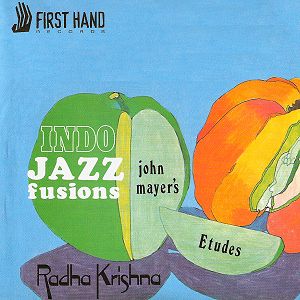1. Intro and Rondo
2. Capriccio
3. Serenade
4. Toccata
5. Saraband
6. Radha Krishna, Act 1
7. Radha Krishna, Act 2
Tracks 1-5
John Mayer - Violin
Chris Taylor - Flute
Ian Hammer - Trumpet, flugelhorn
Tony Coe - Tenor sax, clarinet
Pat Smythe - Piano
Coleridge Goode - Bass
John Marshall - Drums
Diwan Motihar - Sitar
Viram Jasani - Sitar, tanpura
Keshav Sathe - Tabla
Tracks 6 and 7
Clem Alford - Sitar
Keshav Sathe - Tabla
The Lansdowne String Trio
Tristan Fry - Percussion
Coleridge Goode - Bass
Chris Taylor - Flute
Tony Coe - Tenor sax, clarinet, oboe, drums
Neil Coton - Sarod
Susan Lees - Contralto
Austin Miskell - Tenor
Nicolette Bernard - Narrator
The
Beatles are often credited with popularising
Indian music in the West, as a result of their
association with Ravi Shankar. But many of
us had already been made aware of Indian music
in the late fifties through such things as
the films of Satyajit Ray, starting with Pather
Panchali in 1955. John Mayer began attempting
to fuse Indian music with jazz with his Indo-Jazz
Fusions group, which recorded four LPs between
1966 and 1969. Etudes was originally
released in 1969 on the Sonet label and is
only now reissued on this CD, along with Radha
Krishna from 1971.
Indo-Jazz
Fusions began as a double quintet - five Indian
musicians and five jazzmen, including alto-saxist
Joe Harriott. Of Anglo-Indian parentage, John
Mayer trained as a classical violinist but
had for long been interested in blending Indian
and western styles. As early as 1958, his
Dance Suiite for sitar, flute, tabla,
tanpura and symphony orchestra was premiered
by the Royal Liverpool Philharmonic. Indeed,
the second part of this CD - a musical dramatisation
of the story of Radha and her love for Lord
Krishna - is more like a classical piece than
jazz. The Indo-Jazz Fusions experiment created
quite a stir, presenting new possibilities
drawn from the Indian ingredients of ragas
and talas, on which the jazz musicians improvised.
It was an intriguing but seldom a completely
integrated fusion. Later experiments, like
John McLaughlin's Shakti (with Zakir Hussain
and other Indian musicians), were more successful
because they held together better. Yet John
Mayer certainly acted as a pioneer in this
field.
And
there is much to enjoy in the first five tracks
of this album - particularly the improvising
by tenorist Tony Coe. For example, Serenade
starts as if it is a slightly Indianised piece
by Bach, with John Mayer's violin dominant,
but the jazz element surfaces when Coe's swirling
tenor sax enters, to be followed by some equally
jazzy piano from Pat Smythe. Drummer John
Marshall can be depended upon to raise the
temperature whenever he gets a chance, and
there are some good jazz solos from flautist
Chris Taylor and trumpeter Ian Hammer.
Indo-Jazz
Fusions lasted until Joe Harriott died in
1973, and the group was revived by John Mayer
about nine years before his death in 2004.
That revived group included John's son, sitarist
Jonathan - and he has now formed a new group
called The Teak Project, whose
self-titled debut album has just been released
(First Hand FHR 02). Although this group claims
to continue John's work of fusing jazz and
Indian music, the Teak Project is simply a
trio of sitar, guitar and tabla, without any
powerful jazz ingredient. Guitarist Justin
Quinn admittedly has experience in jazz and
rock as well as Indian music, but the jazz
content of the Teak Project's album is disappointingly
low. Their debut album lacks the fire which
made the original Indo-Jazz Fusions so invigorating.
Tony
Augarde
